The Shiva temples in Tamil Nadu are some of the most significant and sacred in India, attracting pilgrims and tourists from all over the world. Known for their rich history, stunning architecture, and profound spiritual aura, these temples showcase Tamil Nadu’s deep-rooted connection to Hindu traditions, especially the worship of Lord Shiva. From grand temple complexes to hilltop shrines, each temple tells a unique story through its legends and inscriptions. Each Shiva temple in Tamil Nadu holds cultural, historical, and architectural significance, making them key destinations for religious and architectural exploration.
Top 9 Shiva Temples In Tamil Nadu
Here is a list of the best 10 Shiva Temples in Tamil Nadu that will make your trip memorable.
1. Brihadeeswarar Temple
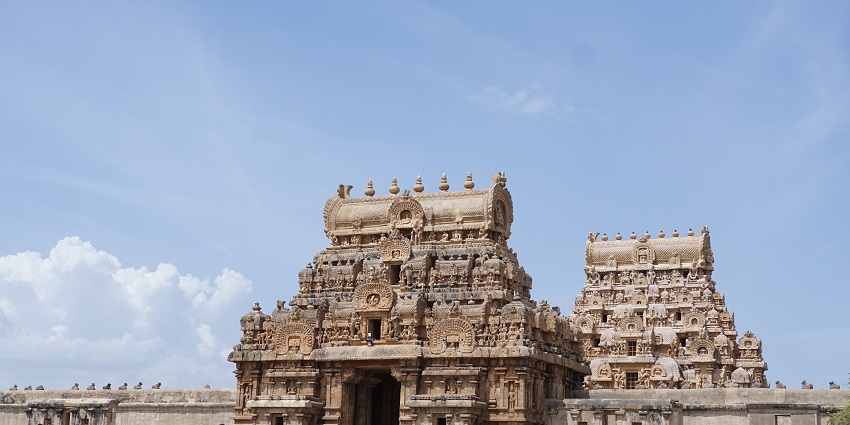
Photo: Vengolis / Wikimedia Commons
Located in Thanjavur, Tamil Nadu, Brihadeeswarar Temple is a UNESCO World Heritage site built by the Chola king Raja Raja Chola I in the 11th century. This grand temple is dedicated to Lord Shiva and is renowned for its massive granite structure, including a towering 66-metre Vimana (temple tower) and a colossal Nandi (bull statue). The temple showcases intricate Chola architecture, and its frescoes, sculptures, and inscriptions reflect the artistic and cultural achievements of the Chola dynasty. It stands as a symbol of Tamil architecture’s zenith during the Chola reign.
Ideal Duration: 1 – 2 hours
Entry Fee: Free
Timings: 6 AM – 12:30 PM and 4 PM – 8:30 PM
Suggested Read: Hill Temples In Coimbatore For A Traditional Touch
2. Ramanathaswamy Temple

Photo: Rangan Datta Wiki / Wikimedia Commons
Ramanathaswamy Temple is situated on Rameswaram Island. It is one of the twelve Jyotirlinga Shiva temples in Tamil Nadu dedicated to Lord Shiva. This temple is closely associated with the epic Ramayana, where Lord Rama is said to have worshipped Shiva here to atone for sins after defeating Ravana. Renowned for its long, intricately carved pillared corridors—the longest in the world—the temple is a fine example of Dravidian architecture. Pilgrims visit to perform sacred ablutions in its 22 theerthams (water bodies) believed to possess purifying powers.
Ideal Duration: 2 – 3 hours
Entry Fee: Free
Timings: 5 AM – 1 PM and 3 PM – 9 PM
3. Kapaleeshwarar Temple
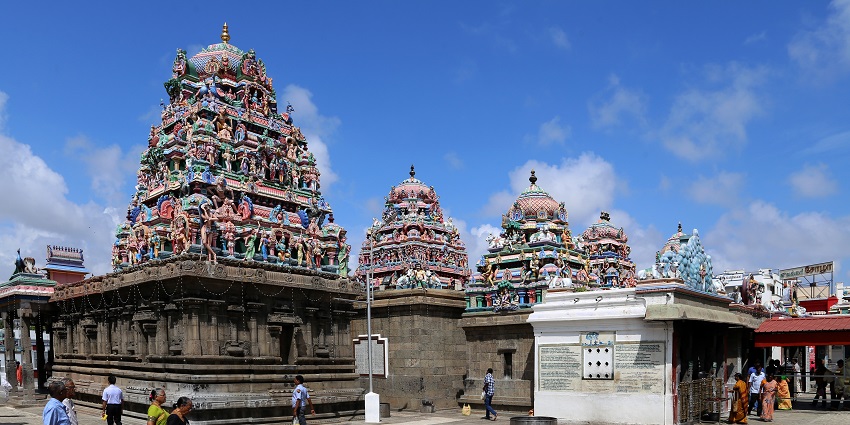
Photo: Sailko / Wikimedia Commons
Kapaleeshwarar Temple is dedicated to Lord Shiva in the form of Kapaleeshwarar and his consort Goddess Parvati as Karpagambal. It is located in Mylapore, Chennai. This temple is built in the Dravidian style with a colourful gopuram that represents an emblematic icon of Chennai. Mythologically, the origin is deeply rooted in the basic foundation that it was here where Parvati, in the form of a peacock, went to worship Shiva. The temple is the hub of most of the religious festivals, and the major one each year is Panguni Peruvizha, which attracts hundreds of devotees from all over the state.
Ideal Duration: 1 – 2 hours
Entry Fee: Free
Timings: 5:30 AM – 12 PM and 4 PM – 8 PM
Suggested Read: Places To Visit Near Chidambaram
4. Meenakshi Amman Temple
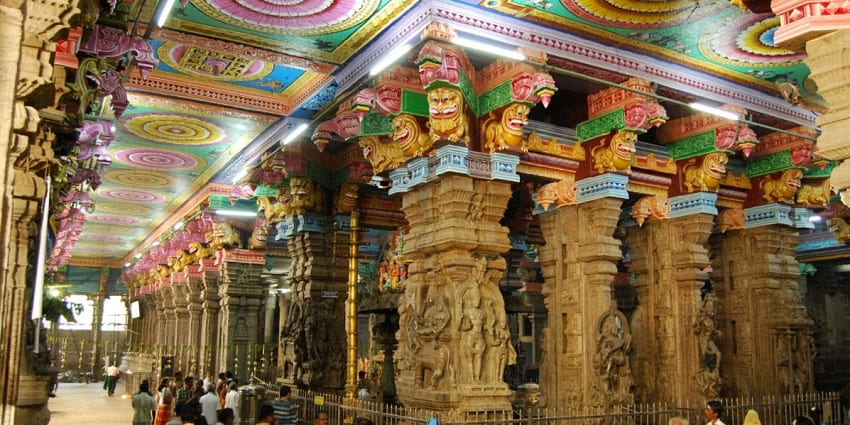
Photo: Shanze1 / Wikimedia Commons
Meenakshi Amman Temple is in Madurai of Tamil Nadu, one of the most famous Shiva temples in Tamil Nadu, where goddess Meenakshi is worshipped in an avatar form as Parvati and Lord Sundareswarar as Shiva. The temple is renowned for the architecture on either side of its gopuram, adorned with thousands of sculptures in their respective colours. Built in the Dravidian style, it covers an area of 15 acres with 14 gopurams and has a sacred golden lotus pond. It is an important pilgrimage centre of Tamil Nadu, where the riotous Meenakshi Tirukalyanam annual festival takes place.
Ideal Duration: 2 – 3 hours
Entry Fee: Free, Special Darshan: ₹50
Timings: 5 AM – 12:30 PM and 4 PM – 10 PM
5. Arunachaleswarar Temple
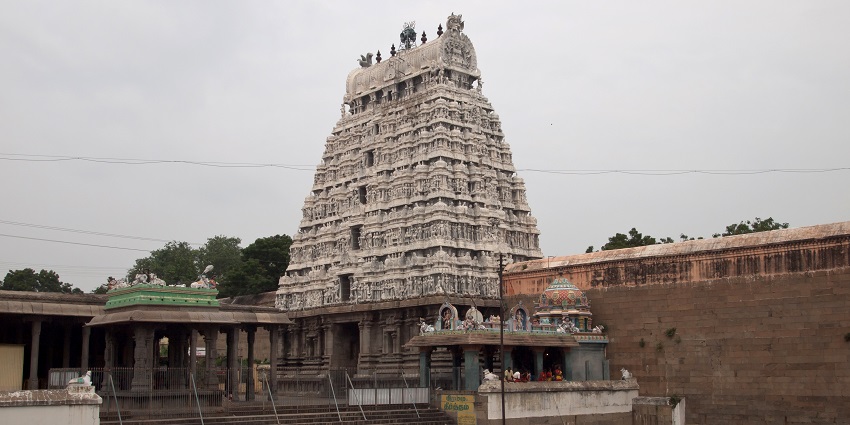
Photo: Vyacheslav Argenberg / Wikimedia Commons
Located in Tiruvannamalai, Tamil Nadu, Arunachaleswarar Temple is one of the Pancha Bhoota Sthalams, representing the fire element. It is dedicated to Lord Shiva, worshipped here as Arunachaleswarar. The vast temple complex has a 66-metre-high gopuram and several shrines, halls, and tanks. The sacred Annamalai hill behind the temple is revered as a manifestation of Shiva. Devotees participate in the Girivalam (circumambulation of the hill) during full moon days. It is also a spiritual centre for seekers of the path of jnana (wisdom).
Ideal Duration: 3 – 4 hours
Entry Fee: Free
Timings: 5 AM – 12:30 PM and 3:30 PM – 9:30 PM
Suggested Read: Places To Visit Near Coimbatore
6. Thillai Nataraja Temple
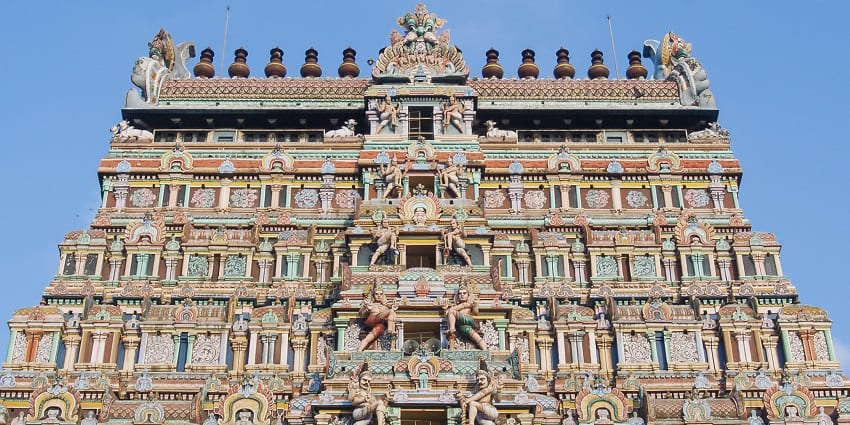
Photo: Matthew T Rader / Wikimedia Commons
The Thillai Nataraja Temple in Chidambaram, Tamil Nadu, is dedicated to Lord Shiva in his cosmic form as Nataraja – the dancing one. The uniqueness of this temple lies in that Shiva here is represented in his Ananda Tandava, or dance of bliss, pose. It symbolises the eternal rhythm of the universe. Further, Chidambaram has been the main base for Shaivism, and its shrine carries the typical Chola-period architecture. It houses the Chidambara Rahasya, which is a renowned philosophical concept representing Shiva’s formless aspect. The annual Natyanjali dance festival held here celebrates the marriage of spirituality with art.
Ideal Duration: 2 hours
Entry Fee: Free
Timings: 6 AM – 12 PM and 5 PM – 10 PM
7. Jambukeswarar Temple
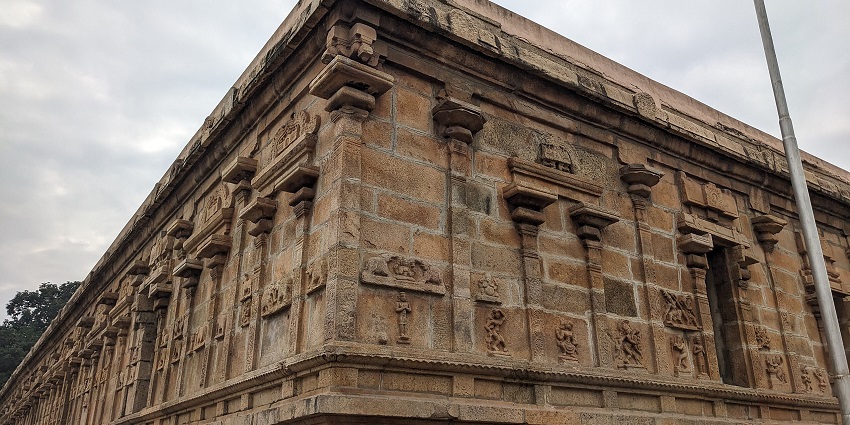
Photo: Vinayaraj / Wikimedia Commons
Jambukeswarar Temple, located in Tiruchirappalli, Tamil Nadu, is dedicated to Lord Shiva and represents the water element among the Pancha Bhoota Sthalams. Shiva is worshipped here as Jambukeswarar and Parvati as Akhilandeswari. The temple is built near a natural underground stream, and its sanctum often floods during monsoons, symbolising Shiva’s association with water. Its architectural features include five concentric enclosures, a characteristic of Dravidian temples, with intricate sculptures and inscriptions. The temple is a prominent pilgrimage site, particularly during the annual Panguni Uthiram festival.
Ideal Duration: 1 – 2 hours
Entry Fee: Free
Timings: 6 AM – 12 PM and 5 PM – 8:30 PM
Suggested Read: Best Places To Visit Near Coonoor
8. Ekambareswarar Temple
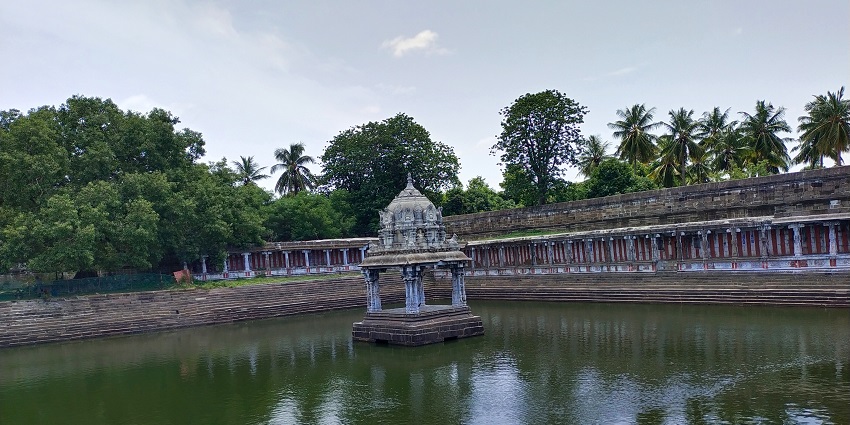
Photo: Luistxo / Wikimedia Commons
Ekambareswarar Temple, located in Kanchipuram, Tamil Nadu, is dedicated to Lord Shiva, who is worshipped here as Ekambareswarar, representing the earth element. The temple, which dates back to the Pallava dynasty, was later expanded by the Cholas and Vijayanagara rulers. Its 59-metre-tall gopuram (gateway tower) is one of the tallest in South India. A unique feature of the temple is the ancient mango tree, believed to be over 3,500 years old, under which Parvati meditated to reunite with Shiva. The temple’s grand architecture and spiritual significance make it a key pilgrimage destination.
Ideal Duration: 1 – 2 hours
Entry Fee: Free
Timings: 6 AM – 12:30 PM and 4 PM – 8 PM
9. Vaitheeswaran Koil
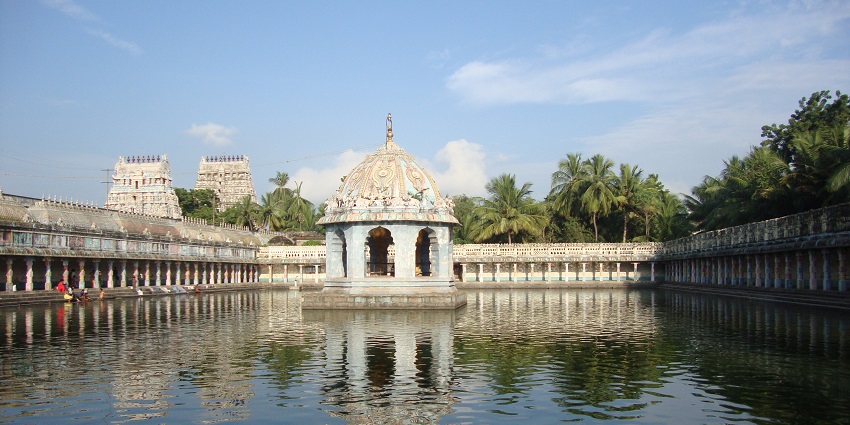
Photo: raguleo / Wikimedia Commons
Vaitheeswaran Koil, in Tamil Nadu, is a famous temple where Lord Shiva is worshipped as Vaitheeswaran, the remover of diseases. The deity is said to have healing powers, and the pious believe that here, one’s prayers shall cure ailments. It accommodates Lord Kartikeya and Goddess Thaiyal Nayaki also. The sacred tank, Siddhamirtham, attached to the temple is believed to possess healing properties. Vaitheeswaran Koil is an important place of pilgrimage where people come to get cured of both physical as well as spiritual illnesses. It also boasts its reputation of Nadi astrology, another form of divination unique to this place.
Ideal Duration: 1 – 2 hours
Entry Fee: Free
Timings: 6 AM – 1 PM and 4 PM – 9 PM
Suggested Read: Best Places To Visit Near Dindigul
The Shiva temples in Tamil Nadu offer a fascinating mix of spiritual heritage, architectural brilliance, and cultural significance. Whether you’re exploring the iconic Brihadeeswarar Temple or seeking solace at the serene Arunachaleswarar Temple, these temples cater to every traveller’s spiritual and aesthetic needs. For a deeply fulfilling pilgrimage or cultural tour, plan your journey with TripXL to discover the spiritual marvels of Tamil Nadu firsthand!
Cover Photo: Alexey Komarov / Wikimedia Commons


 WhatsApp
WhatsApp
 Twitter
Twitter









